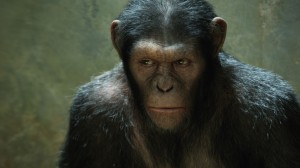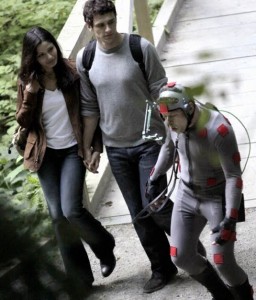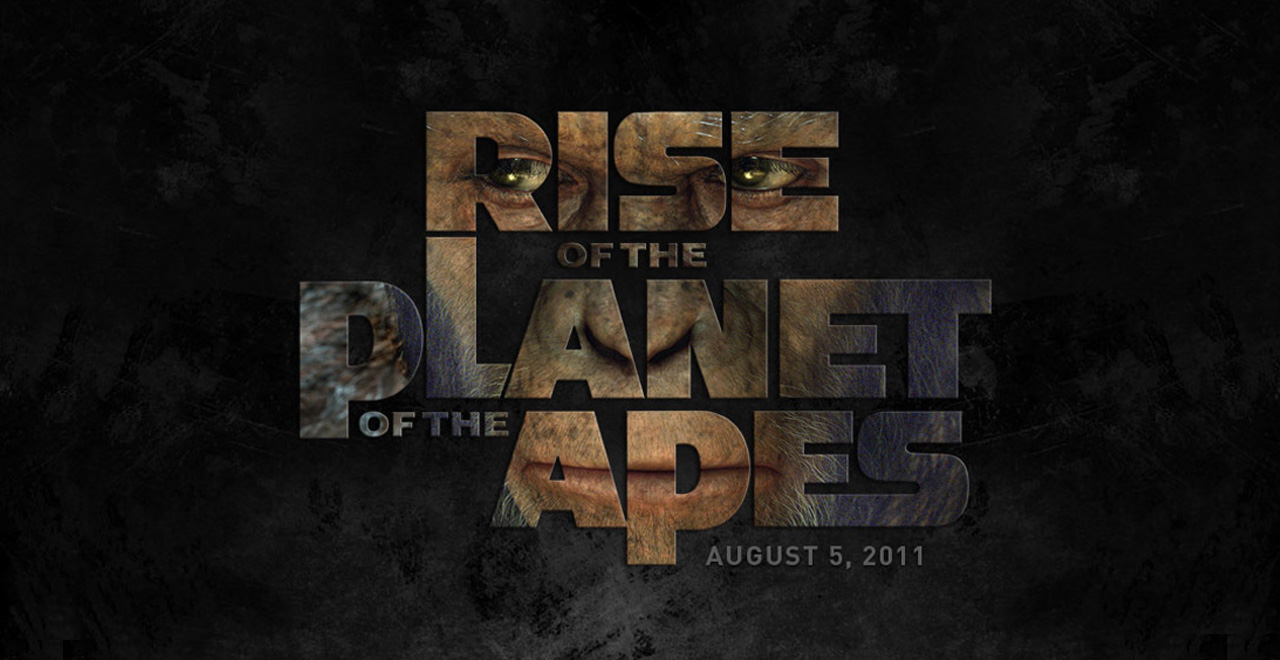The highly anticipated origins story of The Planet Of The Apes is garnering plenty of attention for it’s new take on the classic story and the cutting edge technology from Weta Digital. While Tim Burton‘s updating offered more advanced make up techniques than it’s 60’s predecessor, prosthetics were still used to bring the apes to life. The new film starring James Franco promises to take the imagination to the next level with technology that should convince audiences that the apes have truly evolved.
Set in modern day San Francisco, the new story offers what might happen today, and how it would be possible for apes to rise and take over the world. It all starts with an ambitious scientist Will Rodman (James Franco) who’s trying to help his ailing father (played by John Lithgow) suffering with Alzheimer’s. He works at the high-tech science lab GenSys and starts developing a cure for the disease, a medicine called 112. They start testing the medicine on a chimp named Bright Eyes and some amazing changes occur, however when she dies she passes on the gifts to her son Caesar. Fearing the consequences of raising a newborn in the lab, Will sneaks the young ape home to raise him as his own and as you can imagine, this is where all the problems for humanity begin.
 The film is directed by Rupert Wyatt who had this to say on where the new film fits in with the series:
The film is directed by Rupert Wyatt who had this to say on where the new film fits in with the series:
This is part of the mythology and it should be seen as that. It’s not a continuation of the other films; it’s an original story. It does satisfy the people who enjoy those films. The point of this film is to achieve that and to bring that fan base into this film exactly like ‘Batman [Begins].
Using the motion capture process similar to that used in the ground breaking Avatar flick, the special effects guru’s over at WETA outfitted large stages with the special LED cameras and used the technology for the first time outdoors.
Andy Serkis best known for playing Gollum in the ‘Rings’ trilogy and ‘King Kong’ using similar mo-cap, plays the hyper intelligent ape Caesar who becomes aware of the cruelties of humanity. Terry Notary also plays several different primate characters in the flick and was also the ape movement coach on set.
Andy Serkis had this to say about his character and the acting process:
 It’s a brilliant script and a fantastic modern allegory about man’s abuse of nature… When we’re going about researching apes and so on, you’re not just looking for movement. This isn’t motion capture; we’re not just capturing motion. You can put dots on an ape and let him run wild in a studio, you’d get some great motion but this is about performance… Personally speaking, Caesar is beautifully written character with a very, very big arc and I get to play him from the age of 3 years old until this very innocent chimp reared by human beings up to a kind of Che Guevara character who is leading a revolution basically, with lots of very, kind of, nuanced moments, written and crafted between us in between.
It’s a brilliant script and a fantastic modern allegory about man’s abuse of nature… When we’re going about researching apes and so on, you’re not just looking for movement. This isn’t motion capture; we’re not just capturing motion. You can put dots on an ape and let him run wild in a studio, you’d get some great motion but this is about performance… Personally speaking, Caesar is beautifully written character with a very, very big arc and I get to play him from the age of 3 years old until this very innocent chimp reared by human beings up to a kind of Che Guevara character who is leading a revolution basically, with lots of very, kind of, nuanced moments, written and crafted between us in between.
For every single mo-cap shot, the scenes needed to be shot both with and without the actors so WETA could get all the information they needed. James Franco was asked what it was like working with the mo-cap technology and shooting scenes multiple times:
Well, you can rebel against it or, I kind of have that discussion in my head, like, just complain about this process or I can just go with it and understand that it’s what’s necessary to make this kind of movie. And when Andy’s there, it’s great, it’s akin to a regular acting experience, he’s a performer and I roll with it. And then, when he’s not there, I guess I justify it. You think it’s the death of acting, but you know there are plenty of stage plays where you talk to no one or you are using your imagination in a similar way and you have to create an imaginary world in front of you and react to it, if it’s there.
The actor also spoke about his character and the take on the classic story:
 This rendition of the Planet of the Apes series is different in many ways than the other ones but one of the differences is that the others seem to be much more about commentaries on class relations, inter species relations, race relations, all of these things. Where as ours is a prequel and it’s much more of a Frankenstein story where a scientist is maybe in our case not so moved by hubris, but in some ways he is, but he starts messing with nature and it gets out of hand. So I guess my character just goes from a pure science orientated man who has few connections in life, it’s actually a pretty dismal existence, who doesn’t have much of a relationship with his father and his father has Alzheimer’s so he then starts taking care of him and at the end of his father’s life, towards the end of his father’s life he starts building this relationship with his father that he never had. And then this chimp is thrust on him, so he starts having almost a father son relationship that he never had in his life. So he goes from a very isolated, scientific, cold kind of personality to a much more humane and caring person.
This rendition of the Planet of the Apes series is different in many ways than the other ones but one of the differences is that the others seem to be much more about commentaries on class relations, inter species relations, race relations, all of these things. Where as ours is a prequel and it’s much more of a Frankenstein story where a scientist is maybe in our case not so moved by hubris, but in some ways he is, but he starts messing with nature and it gets out of hand. So I guess my character just goes from a pure science orientated man who has few connections in life, it’s actually a pretty dismal existence, who doesn’t have much of a relationship with his father and his father has Alzheimer’s so he then starts taking care of him and at the end of his father’s life, towards the end of his father’s life he starts building this relationship with his father that he never had. And then this chimp is thrust on him, so he starts having almost a father son relationship that he never had in his life. So he goes from a very isolated, scientific, cold kind of personality to a much more humane and caring person.
This new prequel looks like it could deliver on action and offer an involving story with hyper realistic imagery that’s bound to question the possibilities of science and the future of mankind. The film also stars, Freida Pinto, Brian Cox, and Tom Felton.
Rise of the Planet of the Apes opens August 5th, 2011.
Check out the trailer here:
via: Collider


Comments are closed.